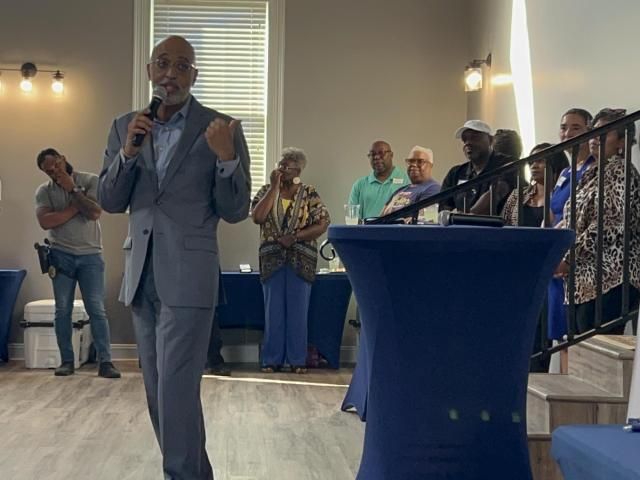North Carolina
NC lawmakers back this week for overrides, but not budget

RALEIGH, N.C. — After more than a month of inaction, state lawmakers will return to Raleigh this week to resume work aimed at finishing the regular legislative session.
Moore has scheduled five veto override votes for Wednesday. Those vetoes include two bills loosening rules for charter schools, two bills targeting LGBTQ+ minors, and one that would change the state’s building code oversight. All five were vetoed by Democratic Governor Roy Cooper in early July.
House override bills
Fairness in Women’s Sports Act. House Bill 574 would ban transgender girls and women from competing in women’s sports in middle school, high school and college athletics in North Carolina.
Gender transition for minors. House Bill 808 would prohibit any medical professional from providing gender-affirming medical care to any transgender patient under 18, including hormone treatments or puberty blockers as well as surgical procedures, even if the minor’s parent consents.
Code council reorganization and amendments. House Bill 488 would divide the state’s current Building Code Council into two bodies, one focused on residential buildings and the other on commercial. It would also ban the council from updating the current building code and adding new energy efficiency rules, and allow the builders of multifamily units to use less fire-proofing between dwellings.
Charter school review board. House Bill 618 would create a new board to vet and grant charter school applications. It would be able to reconsider any application rejections by the State Board of Education from July 2022 onward.
Charter School Omnibus. House Bill 219 includes an array of changes loosening state law governing charter schools. It would allow them to expand without permission as long as they’re not low-performing and allow them to give preferential treatment to some applicants. It would also let them enroll and charge tuition for out-of-state and foreign exchange students. And it would give counties authority to use — and even raise — property tax revenue for charters’ capital needs, which currently isn’t legal. It would also ban regulators from considering the impact of a new charter on local school districts in the application process.
A supermajority with no wiggle room
Republicans in the state House and Senate hold veto-proof majorities — but only barely. A veto override requires support from all 72 Republicans in the House and all 30 Republicans in the Senate. If even one or two Republicans are absent, and if all Democrats are present and voting against an override, it will fail.
The regular legislative session is usually over by mid-July, so many lawmakers schedule travel, family vacations and medical procedures in mid-July and August, making it a challenge to get all of them into the chamber on any given day in that period.
The House and Senate also have differing rules on how vetoes are handled. The law doesn’t require, and neither body has set, a time limit within which they have to take up a veto override, also known as “reconsideration.”
The Senate’s rules require the majority party to give 24 hours’ notice to the minority party before an override vote can be held. The House’s rules are less strict, allowing an override vote “on the legislative day [a veto] is received in the House from the Senate or Governor or any other legislative day it is printed on the calendar,” which often isn’t published until late the preceding evening.
If House Republicans aren’t sure they’ll have sufficient members present to override a veto, they’ll generally reschedule the override vote rather than risk it. In the Senate, there are fewer members to account for. They generally don’t schedule an override vote until they’ve found a day that will work.
The other veto
A sixth veto could be taken up this week, but it wouldn’t start in the House.
It was vetoed July 5 by Democratic Governor Roy Cooper, who called it a “don’t say gay” bill, evoking a law passed in Florida. Cooper warned it would “scare teachers into silence by injecting fear and uncertainty into classrooms.”
Under legislative rules, vetoed bills get their first override vote in the chamber where the bill originated. The bill was sent to Senate Rules July 6 and has not moved since.
Speaking to reporters July 31, Senate leader Phil Berger said the Senate will vote to override the veto of S49 “at some point.” So far, no override vote has been scheduled.
Berger spokeswoman Lauren Horsch said last week that the full Senate is expected to be in Raleigh this week, but no votes are on their calendar yet.

North Carolina
USDA terminates annual Hunger Survey as food banks see growing demand

RALEIGH, N.C. — The U.S. Department of Agriculture is ending its annual survey that tracks hunger in the country, despite the rise in food costs.
Here in North Carolina, where more than 600,000 people face food insecurity, local organizations like The Food Bank of Central and Eastern North Carolina say the cuts could affect how they can serve families in the state.
At the Food Bank of Central and Eastern North Carolina, dozens of volunteers spend hours packing boxes with bread, milk, meat and canned goods, some essentials for families who can’t afford to purchase them on their own.
Here in North Carolina, officials say over 600,000 people face food insecurity. That’s why staff and volunteers say the timing couldn’t be worse.
Volunteer Cathy Engel says it’s not just about packing the food, but building a connection with a family even if it’s brief.
“Meeting all the people that come in and talking to them, that’s what makes me want to continue to come,” Engel said.
She says that in her five years of service she’s seen the need for food increase, but supplies are decreasing.
“We’re much more limited in what we give out, and even what the food shelves are limited in, what they’re allowed to get from this distribution center,” she said.
Vice President Jason Kanawati Stephany agreed, saying that the USDA’s decision could cause more harm than good to communities in need.
“Our pantries are seeing near unprecedented need. So we don’t need that government data to validate that experience,” Kanawati Stephany said. “But here’s where the government data is vital. It’s vital for us to make decisions about where we invest our resources. And more importantly, it tells government leaders where resources and investments are needed.”
“Trends in the prevalence of food insecurity have remained virtually unchanged, regardless of an over 87% increase in SNAP spending between 2019-2023,” the USDA said in its announcement.
But volunteers aren’t giving up, and entire organizations like Blue Cross N.C. are sending employees to help meet the growing need.
Lori Taylor, health food director at Blue Cross N.C., said it’s important to step away from everyday tasks and give a helping hand.
“This is the way that we can all make an individual contribution together,” Taylor said.
Engel says they’ll continue to show up.
“It’s hard to be hopeful, but this place gives me hope,” she expressed.
In 2023, 47 million people lived in food-insecure households, according to the USDA. Of those, nearly 14 million were children.
The survey has been published annually for 30 years, throughout both Republican and Democratic administrations.
The last report is scheduled to be released on Oct. 22.
North Carolina
VP JD Vance is coming to NC this week to talk public safety

Tuesday, September 23, 2025 5:46PM
CONCORD, N.C. (WTVD) — Vice President JD Vance will visit North Carolina on Wednesday.
He will be in Concord to talk about public safety following the murder of Ukrainian refugee Iryna Zarutska. This comes after the state Senate passed a reform bill called ‘Iryna’s Law,’ which would eliminate cashless bail and lays out new condition for pretrial release for certain violence offenses.
This will be Vance’s first trip to the Tar Heel state since becoming vice president.
Copyright © 2025 WTVD-TV. All Rights Reserved.
North Carolina
City leaders eye improvements to Raleigh’s Dix Park as DHHS moves out of park buildings

RALEIGH, N.C. (WTVD) — As the North Carolina Department of Health and Human Services prepares to vacate several buildings at Dorothea Dix Park, the City of Raleigh is taking full control of the 308-acre property. City leaders say the future of the park is just beginning
Dix Park welcomed over 600,000 visitors between June and August, with guests from 42 states. It was the second most visited destination in North Carolina this summer, trailing only Wrightsville Beach.
City officials and the Dix Park Conservancy are now focused on the next phase of park improvements.
“During COVID, we learned that our parks became our sanctuaries of sanity,” said Raleigh City Council Member Mitchell Silver. “It’s where people go to feel mentally and physically healthy. We want that for our city.”
One of the park’s most notable additions this year was the opening of Gipson Play Plaza, now the largest adventure playground in the Southeast.
More upgrades are planned, including new public art installations and renovations to existing structures.
Ruffin Hall, president and CEO of the Dix Park Conservancy, outlined some of the upcoming enhancements.
“There’s lots of fun things going on at the park: House of Many Porches where you can go and grab a snack, renovating the Flowers Cottage next to Flowers Field,” Hall said. “We’re also looking at renovating the dog park and the trolls.”
With DHHS preparing to vacate state-owned buildings on the property, some structures will be demolished, while others may be retrofitted for new uses.
“To me, that’s a great opportunity, having a nice enclave of some market rate residential buildings,” Silver said. “Long-term leases or sales could generate money to reinvest in the park.”
Silver has seen this model succeed in other cities, where revenue from residential developments fully funded park improvements without relying on taxpayer dollars.
Plans also include a new entrance on South Saunders Street, and the city is exploring expanded public transportation options to better connect the park with downtown Raleigh.
Many of the park’s improvements have been made possible by a $75 million fundraising campaign led by the Conservancy.
“The City of Raleigh has some tremendous donors, civic-minded folks who made generous contributions,” Hall said. “That partnership with the city is what really made this happen — and that’s what makes Raleigh so special.”
Copyright © 2025 WTVD-TV. All Rights Reserved.
-

 Finance7 days ago
Finance7 days agoReimagining Finance: Derek Kudsee on Coda’s AI-Powered Future
-

 World6 days ago
World6 days agoSyria’s new president takes center stage at UNGA as concerns linger over terrorist past
-
North Dakota7 days ago
Board approves Brent Sanford as new ‘commissioner’ of North Dakota University System
-

 Technology6 days ago
Technology6 days agoThese earbuds include a tiny wired microphone you can hold
-

 Culture6 days ago
Culture6 days agoTest Your Memory of These Classic Books for Young Readers
-

 Crypto6 days ago
Crypto6 days agoTexas brothers charged in cryptocurrency kidnapping, robbery in MN
-

 Crypto7 days ago
Crypto7 days agoEU Enforcers Arrest 5 Over €100M Cryptocurrency Scam – Law360
-

 Rhode Island7 days ago
Rhode Island7 days agoThe Ocean State’s Bond With Robert Redford



















